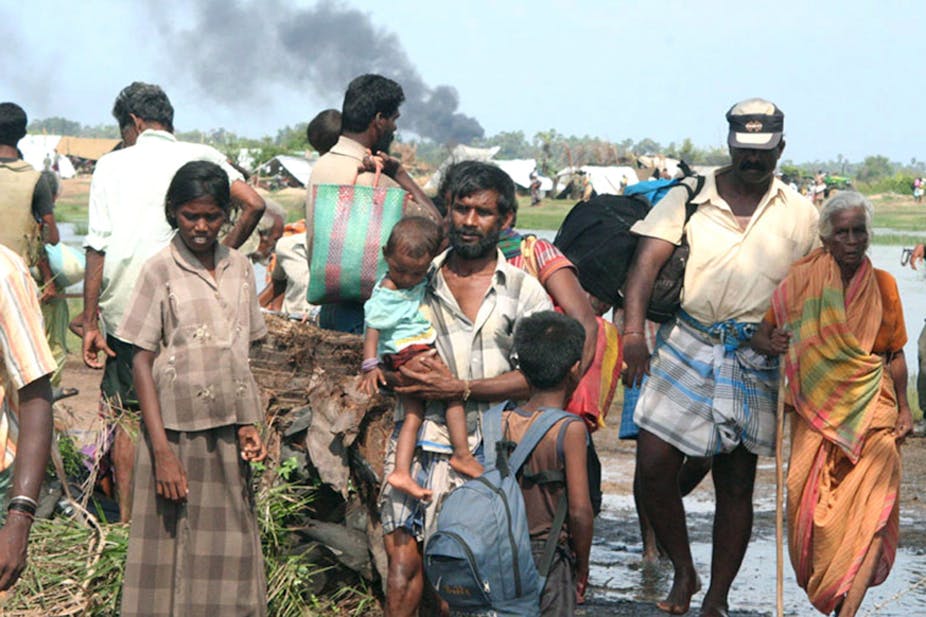Australian prime minister Tony Abbott announced earlier this week that he would not join his Canadian, Indian and Mauritian counterparts in boycotting the Commonwealth Heads of Government Meeting (CHOGM) in Sri Lanka, which begins tomorrow.
Calls for a boycott grew after Greens senator Lee Rhiannon was detained in Colombo last weekend and prevented from speaking to the media.
While Sri Lanka’s vexed recent history with human rights abuses cannot – and should not – be ignored, the history of controversies in the Commonwealth suggests that the best way to deal with problem member nations is through engagement, not boycotts and suspensions.
Moral governance
Affairs of state can often lead nations to make strange and sometimes unpleasant bedfellows.
Australian politicians are, for the most part, pragmatists. In general, trade and security is more important to Australia than moral posturing over human rights. Sri Lanka’s co-operation on the asylum seeker issue is of critical importance to Australia.
Some international forums, however, are precisely about moral governance. And if they are not about that, then it is hard to understand the reason for their existence. CHOGM is one such forum.
In December last year, the Commonwealth’s 53 members adopted a Charter of the Commonwealth. This commits member states to a raft of principles including democracy, human rights, the rule of law, freedom of expression, tolerance, respect and understanding.
One of the core purposes of CHOGM is to reiterate the importance of these values and give Commonwealth leaders the chance to demonstrate that they are good members of a club of liberal-democratic, rights-respecting states.
In this context, Abbott’s statement that he “doesn’t propose to lecture the Sri Lankans on human rights” is absurd. Even the most sympathetic supporter of Sri Lankan president Mahinda Rajapaksa would agree that “lecturing” is towards the lower end of the international community’s possible responses to his government’s human rights failures.
Boycotts vs engagement
However, there is some merit in the idea that troubled states are more effectively dealt with by engagement than isolation, though the Commonwealth has no consistent position on this.
After the Sharpeville massacre in South Africa (where police killed 69 black South Africans), Malaya, India and Canada demanded the Commonwealth expel South Africa in 1961. Britain, New Zealand and Australia supported a “keep South Africa in” policy.
Several of the Commonwealth’s members declared they would not be members of an organisation that included a racialist state, and South Africa eventually withdrew its application for membership.
Since then, the path of suspensions and boycotts has been tried with several nations – most recently with Fiji. The results have been mixed. While Fiji has a new Constitution and the promise of elections next year, it remains suspended from the Commonwealth.
It is right, therefore, to be suspicious of the “quick fix” of a boycott. It is a seductive option – it could relieve a government’s feeling of impotence in the face of atrocities. But it does little to address issues of state capacity that lie at the root of many human rights violations.

A better alternative
There is a middle path between boycott and buy-in. In 1995, the Commonwealth Ministerial Action Group (CMAG) was established specifically to deal with states that showed signs of sliding away from Commonwealth values such as democracy and the rule of law.
Zimbabwe, Pakistan, Nigeria and Fiji have all at various times found themselves on the agenda of CMAG. Being placed on CMAG’s agenda serves as both a rebuke and a warning to states – but it does not close down the channels of engagement. At present, Fiji is the only country on the CMAG agenda.
Undoubtedly, it would be awkward to place the host of CHOGM on the CMAG watchlist. But several British parliamentarians have been agitating for this to occur. While Britain is not a current member of CMAG, Australia is, together with a host of nations including Canada.
It is not clear whether Sri Lanka’s position on the CMAG agenda was discussed when the members of CMAG met in New York in September this year. But it should have been, and Australia should have adopted a leadership position in relation to placing Sri Lanka on the agenda.
There have been several occasions in the Commonwealth’s history when it faced a crisis that seemed to threaten its existence: Suez in 1956; South Africa in 1961; Rhodesia in 1966. The membership of the organisation, and its ethos as an institution dedicated to principled governance, has always been at stake.
If the Commonwealth is to survive, Australia must ensure – at a minimum – that Sri Lanka is placed on the agenda of CMAG.

